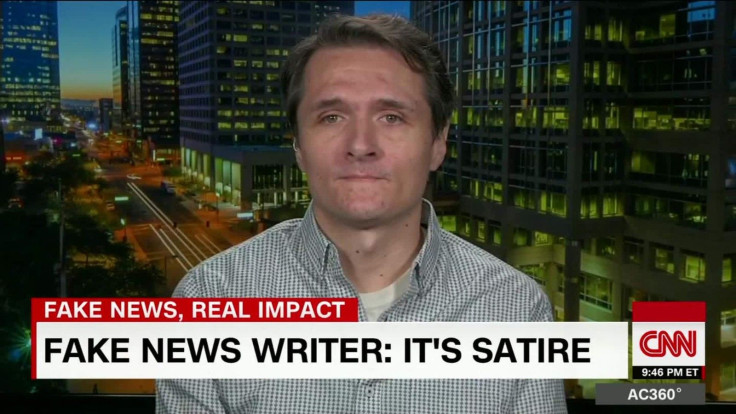Does Fake News Help Trump? This Writer Plans To Stop The White House By Publishing Lies

Paul Horner, the man known for his sham articles that spread across the internet, has published his latest story: “Twitter Deletes Donald Trump’s Twitter Account: ‘We Will Not Tolerate Racism and Hate.’”
The site cnn.com.de also features articles about President Barack Obama banning the national anthem and declaring September National Muslim Appreciation Month. These reports, like all of the stories written and published by Horner, a 38-year-old writer of satire and fake news, are bogus. Twitter is not deleting President Donald Trump’s account. Obama has not banned the national anthem. There isn't a federally mandated month dedicated to Muslims. And the website that hosts these stories, cnn.com.de, is not affiliated with CNN.
Amid a national conversation about fake news and how such stories influence public opinion, Horner became famous online after Election Day for claiming his fabricated reports helped turn voters against Democrat Hillary Clinton. With the former business mogul now in power, Horner wants to use fake news -- or "shenanigans," the term he prefers -- to take down the president. He's convinced that his writing has a purpose: to use false information to give people the truth.
Interest in fake news rose dramatically around the time of the U.S. presidential election, when the campaign between Trump and his equally unpopular rival, Hillary Clinton, saw fabricated stories mushroom on social media. Google searches spiked from the last week of October to the second week of November. Since then, the term “fake news” has been regurgitated and debated by lawmakers, academics, journalists and other Americans.
Horner told the Washington Post in November he was afraid his stories helped put Trump into the White House, and his notoriety was exacerbated when he said Trump supporters were naïve.

Horner began receiving hate messages calling him scum after the interview. He stepped back from publishing his fake news stories, keeping a low-key profile on his hoax news sites for the next month. In January, he began writing once more, this time with a new approach.
His story about Twitter deleting Trump’s account is filled with fabricated quotes. The journalist who supposedly wrote the story -- Jimmy Rustling, who has Pulitzers, a mail-order bride and an adopted Syrian daughter, according to his online biography -- does not exist. It's the pseudonym Horner uses for his fake CNN site.
Horner's story leans heavily on hyperpartisan anti-Trump rhetoric. Trump, according to the story, appointed a climate change denier as head of the Environmental Protection Agency (perhaps skeptic is a more accurate term, as Scott Pruitt has admitted that the climate is changing, although he said the extent to which human activity causes that change is debatable) and a person who “doesn’t believe in public education” in charge of the Education Department (Betsy DeVos has criticized the way public education operates, but she hasn’t said she wants to do away with the system entirely).
Yet throughout the piece, Horner also references and links to several stories from reputable media outlets such as The New York Times, Time Magazine and Vanity Fair. This tactic is markedly different from many of his previous political hoax news pieces, which were mainly crafted from his imagination.
The goal is to lure people in with a false, clickbait title -- “Twitter Deletes Trump’s Twitter Account” has gotten over a million views, Horner said -- and then offer them persuasive facts in the story.
“It gets that person that’s a follower of TMZ -- people that don’t follow anything political or know anything really that’s going on, they just know Donald Trump is our next president… it gets the person who will read that story (to) pretty much (be) forced to learn about everything that’s negative about Trump,” Horner said.
If the comments on the story are any indication, however, not everyone is getting the message.
"Cnn and the rest of the liberal media are just scared Trump can communicate directly with the American peole and does not need the media or that they cant control the narrative. They are trying to silence his 1st amendment the most un-american thing they can do," one visitor to the site wrote.
Horner, who lives in Phoenix, is used to juggling multiple tasks at once. He spoke with IBT over the phone while heading to a Safeway grocery store in an Uber. After the driver seemed to become confused with directions and took a few wrong turns, Horner canceled the ride and left the car.
“Oh my god, what was wrong with that f*cking guy?” he said. And then: “Sorry about that … I’m walking back to my apartment right now. Let’s do this again.”
Writing hoax stories may be lucrative -- $10,000 a month through Google’s AdSense program, he said -- but it’s not all he does. He also deals in online day trading. He tries his hand at stand-up comedy. He writes for his online journal. And he runs the charity Sock It Forward, which he plugs in many of his fake news stories.
Horner takes pride in his work, differentiating himself from “crap” fake news sites, he said.
“I could write a story right now about Paul McCartney from The Beatles dying, and it would go viral, and it would make $10,000 in ad revenue,” Horner said. “But there’s no purpose, it’s morally wrong. That’s why I don’t do it.”
It's that same moral code that guided Horner when he published a story called “The Amish In America Commit Their Vote To Donald Trump; Mathematically Guaranteeing Him A Presidential Victory” in October.
“The purpose of the story was to try to get Trump supporters not to go out and vote, thinking that they didn’t have to vote now because the Amish had locked up the vote,” Horner said. After the election, he “started thinking maybe that story helped him get elected.”
But some of his articles seem to have no purpose at all. Another one of his recent stories carried this headline: “Police Officer On LSD Attempts To Save Anti-Masturbation Dolphin Mascot From Imaginary Fire.”
The fact is, fake news has been around for at least hundreds of years. In the 15th century, a priest in Italy spread rumors that Jews murdered a Christian toddler, drained his blood and drank it to celebrate Passover. And then there’s the Spanish-American War. Just over 100 years ago, the U.S. found itself in a military conflict thanks to two news empires driven by sensationalism.
Media critics today debate about what falls under the umbrella of fake news. Is it total fabrication to get clicks and money? Conspiracy theories on message boards? What about reports with questionable information (see BuzzFeed’s Golden Showers scoop), or selecting certain facts in news stories while intentionally ignoring others? Some critics now cry “fake news!” over facts they simply disagree with.
All of that is further complicated by the online infrastructure that directs how falsities are spread, which is often through Facebook and Twitter. Since the “fake news” news exploded in November, Facebook and Google both announced measures to try and curb stories that peddle false information. Google, for instance, has pledged to ban fake news sites from AdSense, its advertising service.
“The most critical way to counter fake news now is (for the press) to be extremely skeptical when confronting Trump,” said Angelo Carusone, president of Media Matters, a non-profit, progressive watchdog group based in Washington, D.C.
Louis Jacobson, senior correspondent for fack-checking site PolitiFact, went even further, arguing that no real progress will come unless other systems are changed.
“We and other fact checkers are working with Facebook to check and label questionable, widely shared posts,” Jacobson said. “I hope this proves valuable, but we're just starting, so it's too soon to know. The other solutions to this problem, such as better education of students about critical thinking, are only going to occur over the longer term.”
Horner, for his part, said he supports efforts to curb false information.
“I can tell you that I’m a big fan of Facebook and Google’s attempt at getting rid of the actual fake news that’s out there,” he said.
His stories haven’t been targeted by Facebook or Google, he said, and he isn’t worried about being shut down himself.
Is Horner concerned that his new stories will backfire and build support for the Trump?
"There’s no chance of getting him elected twice," he said.
© Copyright IBTimes 2024. All rights reserved.












